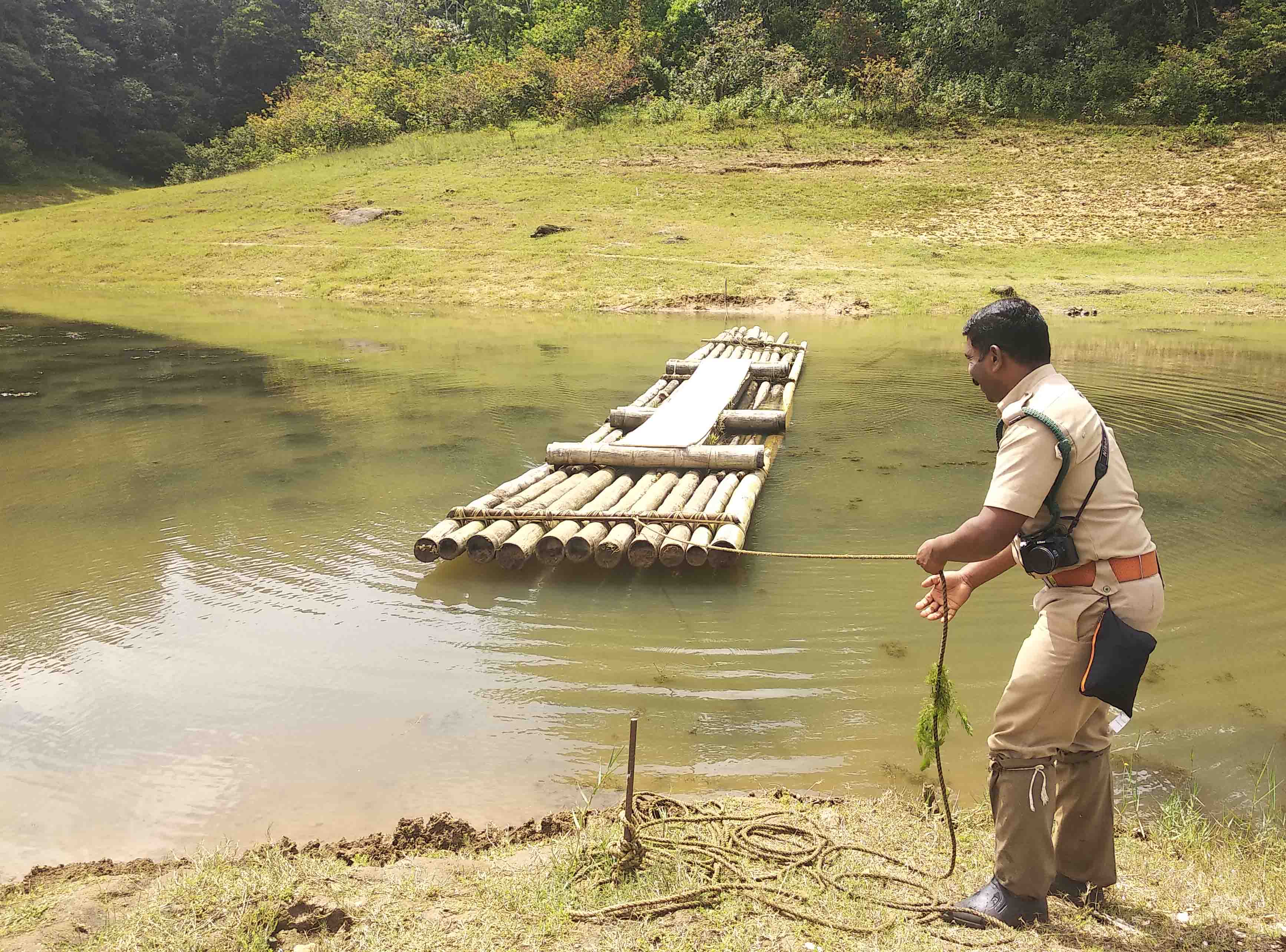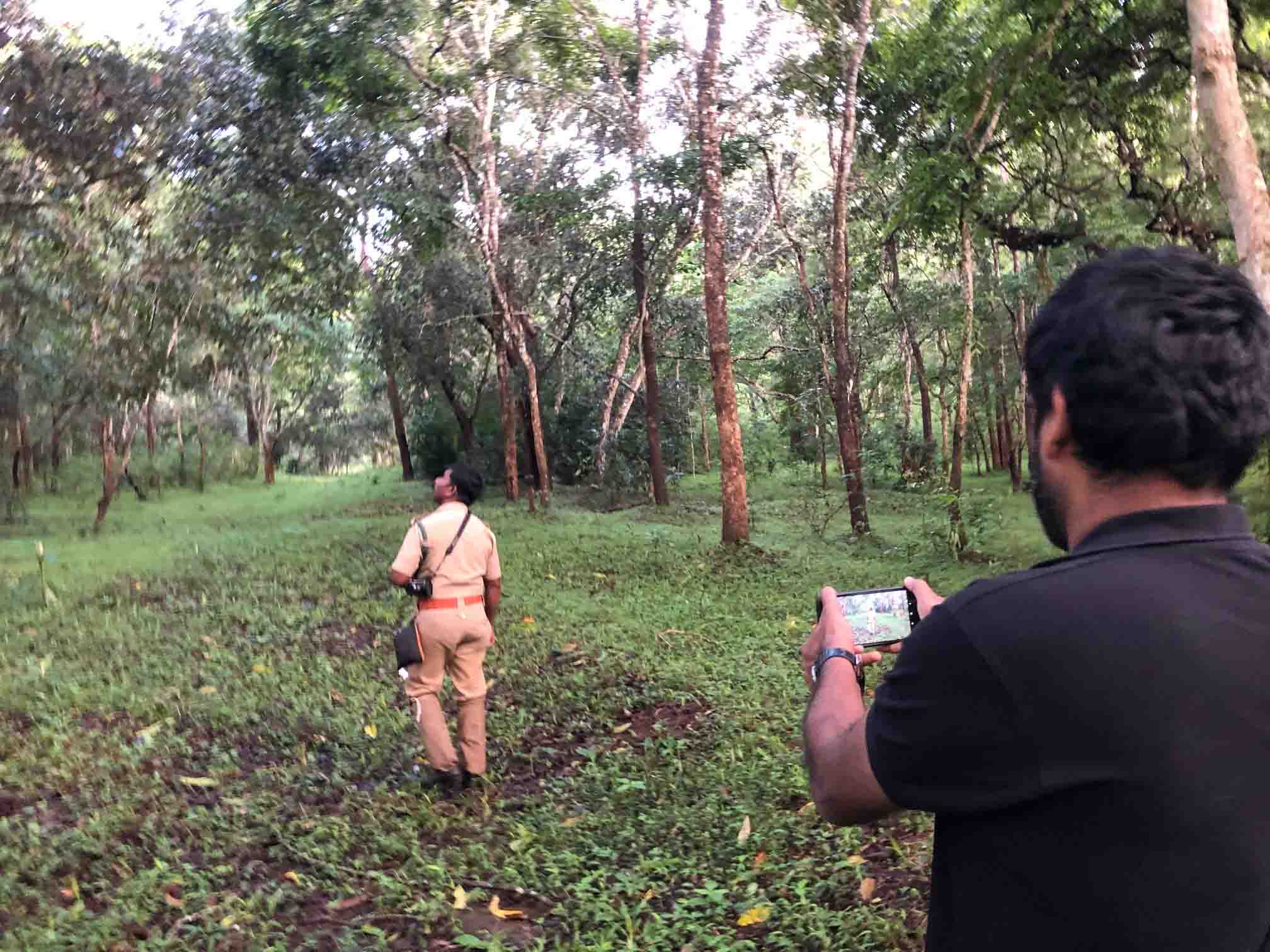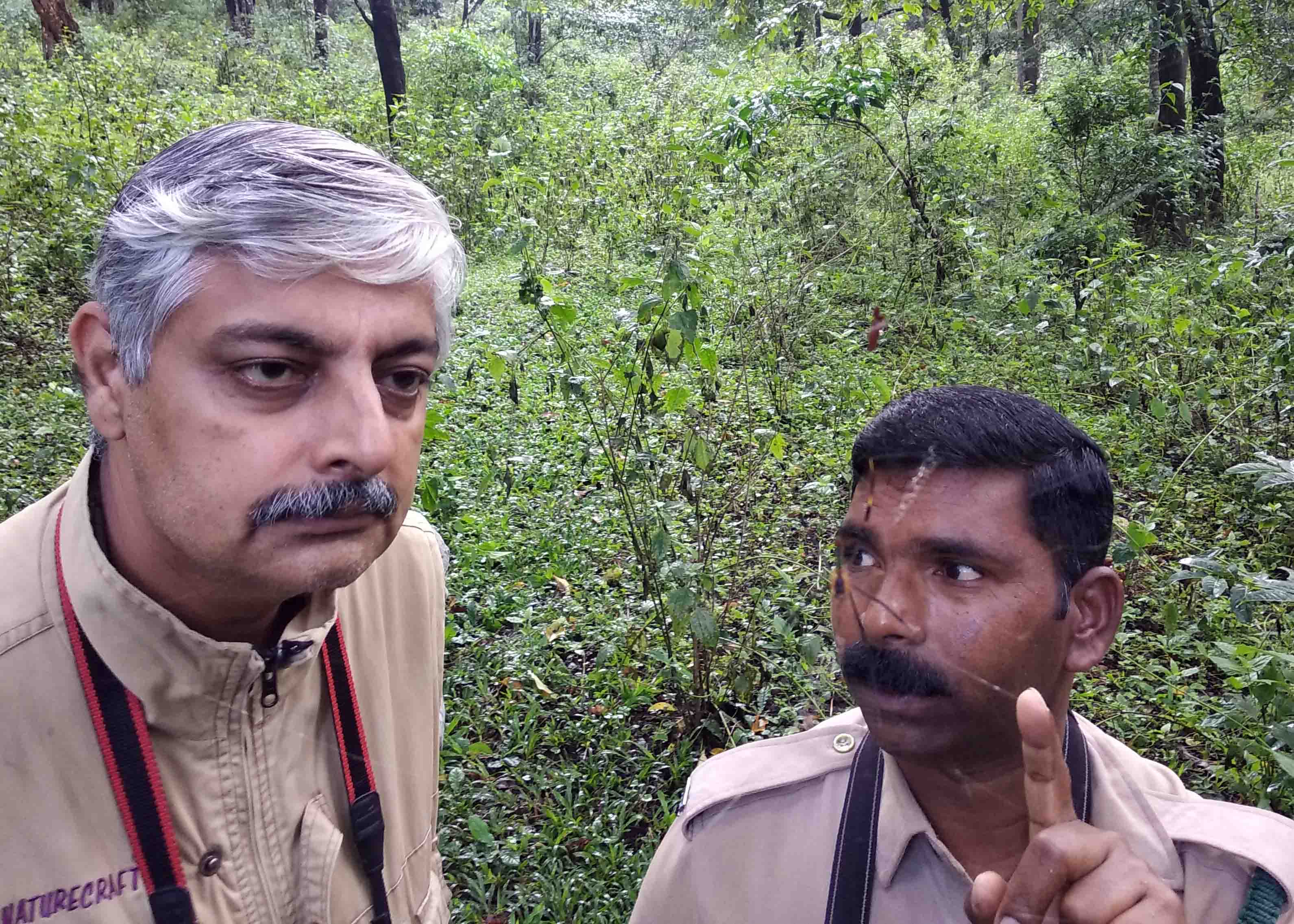The Guardian of all Creatures Wild: Meet Jayan from Periyar Tiger Reserve
“Look at this spider! The pedipalps appear very much like an ant, but when you look at the cephalothorax closely you can see the eyes, it is a classic example of morphologically mimicking a red ant that is found here. This helps them in finding food and also save it from predators “ – Jayan shared with us, pointing out a spider in our forest walk through Periyar Tiger Reserve on a rainy day.
Jayan has no degree in life sciences. He is a forest watcher at Periyar Tiger Reserve, a son of soil by birth and life. Jayan’s journey as a watcher began about twenty years ago in the Tiger Reserve a couple of years after he clearing his tenth school standard . He has been an organic part of the Tiger Reserve ever since. Jayan hails from the Mannan tribe of Periyar landscape. The tribe has their own tribal king and their sacred culture and rituals which they have continued to preserve in harmony with tiger, elephant and the countless forms of life in the reserve.
We met Jayan during our stay in the park as part of our work. It was interesting to see Jayan patiently engaging me and Vivek Menon (Founder & ED, WTI) while he spoke of spiders and every small detail about them. Such skill and knowledge comes only after putting years of dedicated and keen observation of the environment around us.

Irrespective of the fact that Jayan has no formal training in identifying animals around him, it is commendable that he could identify all the birds, recognize them from the calls and demonstrated exceptional knowledge of butterflies and trees. His confidence and understanding of the subject and their behaviour is worth appreciation and a few of them you might not even find in books that describe these species! I couldn’t stop myself from asking as to what led to this level of expertise, to which he humbly replied, “I spend hours watching and observing them in the wild and that’s how I learned about them”.
Jayan does follow some of the best reference guides and the crumpled pages did indicate that these books have seen countless field days.
While sitting with Vivek and explaining each spider picture, Jayan sounded no less than a zoology guide. It is an honest confession that my brain cells, that are hugely influenced by serpents and bees were apprehensive to learn about spiders yet, but it was such a delight watching him explain spiders with such enthusiasm.
A little later, the conversation moved from wildlife to his clan and we spoke for hours as he narrated about their rituals, celebrations and how their chosen king and their community system takes care of various issues within their community and the lifestyle they follow. To which the most interesting thing we found was that his real name is “Thevan” and Jayan is the official name as per government records.
“So, what should I call you?” Vivek asked. “If you call me Thevan then you become a part of my family and clan because that is what they refer to me as!” Jayan replied. From that very moment, Vivek became a part of Jayan’s err.. Thevan’s family.

Life as a frontline forest staff is not easy. It might appear to us that they lead a idyllic life in the lap of nature, but the reality is that every work day makes them face numerous hurdles and inconveniences while at work. This reality has mud, leeches, scorching sun and heavy rains in it. Jayan talked about some of his field camping days where they were chased by elephants multiple times, where wits and jungle craft saves lives. For him this is a part of camping life in the forest where you come across elephants who are not always happy to see you.
One incident that Jayan narrated to us was of him walking into a mother sloth bear with cubs on her back while crossing a grassland. “I had scanned the place before and was walking casually, totally oblivious of the bear in the grass. For a moment I froze and started walking backwards, by then my fellow mates came closer, seeing this the bear spared us! A mother bear with cubs is more dangerous than elephants – they are very short-tempered!”, stated Jayan with a laugh.
Jayan also shared reminiscences of the legendary “Thadi Kannan “ (late) – bearded Kannan as there were quite a few Kannan’s’ in the park. Kannan was also a tribal watcher whose name is an inevitable part of the history of Periyar and will never be forgotten. Jayan also had his field days with Kannan where Kannan used to teach the youngsters about the best-kept secrets of the deeper pockets of Periyar – exactly like the tribal elders teach their younger folks, these teachings are key to their survival in the wild.
The jungle stories were never-ending. He remembered how the forest watchers and a ranger chased a gang of sandalwood smugglers and arrested eight of them in a surprise move, and how he and his team survived a night in pitch darkness in torrential rain in the forest. Each of these stories were about the reality of commitment of people like him who quietly serve the spirit of the forest.
“I am part of this forest, it’s the best job I can do and would like to be part of the forest even after my death. My world starts and ends here in the mountains of Periyar“ said an emotional Jayan.
Conservation success of each park in the country owes to these frontline foot soldiers who may not attain the status of conservation heroes in the eyes of the public. But the truth is that they serve the forest before and after their official service days with an indomitable faith, as for them, the forest is the true God and a part of their life.
Saluting their spirit, I bow my head for their service, which is unmatchable.
Ranger is a term used to identify any person who works as the protector of forests and wildlife. In India the term” Ranger “ is used for Range Forest Officers (RFO) which is an official title and often people think that the the world ranger day is for range forest officers. World Ranger Day is a day to commemorate all those who protect forests regardless of rank.
The Indian forest rangers across the country have diverse flora and fauna to protect ranging from the snow-clad Himalayas to the sandy seashores where they guard wildlife ranging from snow leopard to sea cucumber around the clock.
The real life on the frontlines of a Indian ranger is fraught with dangers and the number of forest personnel who get killed on the line of duty in India tops the global charts every year. They get challenged by armed poachers who come to hunt, criminals who steal timber, sand miners, and sometimes the very animals they protect that attack them. Amidst all this, rangers across India patrol the core of our forests on foot.
The real life of a frontline ranger is not “cool” as many of us think. These unsung heroes are the true conservation warriors and the reason behind India’s rich biodiversity and forests with tigers, rhinos and elephants and old trees still standing – because many of them stood their ground armed with sheer determination to protect and nothing else.
There is a retired ranger whose feet I touch every time I meet. It is sheer respect and once he told me, “Whenever a poaching gang attempted an entry into my forest to kill my rhinos, we were there to stop them, there were days when me and my boys walked the whole day and night, drenched in perpetual rain without food and shelter to prevent the hunt ..fearing the rhinos, tigers elephants, snakes and the poachers at the same time. Now when I look back I just feel good for what we contributed with our life “. This summarises the life of the forest ranger in India, the unsung lone rangers of the wild.
Jose Louies, the author of the article, is Chief, Wildlife Crime Control Division, Wildlife Trust of India.
A self trained apiculturist, Jose has a keen interest in snakes and snakebites and also is the founder of www.indiansnakes.org
He can be contacted at jose@wti.org.in









